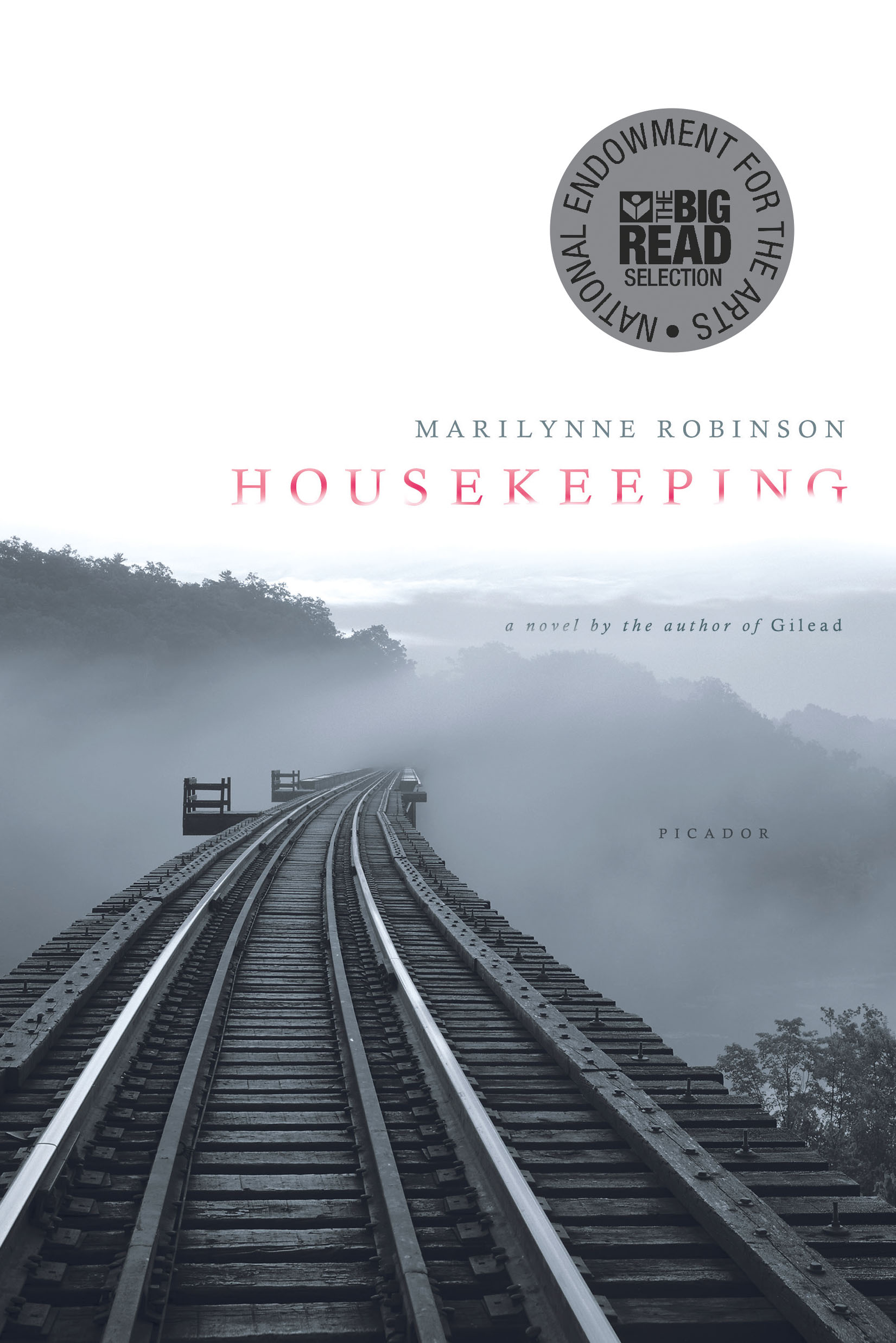Housekeeping

Overview
Even avid readers will be hard pressed to find another novel quite like Marilynne Robinson's luminous Housekeeping. Set in the remote, imaginary town of Fingerbone, Idaho, it presents the precarious and eccentric lives of three generations of Foster family women. Housekeeping chronicles the deaths, abandonments, and insecurities that beset the Fosters so vividly that it is often heartbreaking, but the novel also radiates a mysterious joy and tender humor commensurate with Ruth's childlike capacity for the sheer wonder of being alive.
"I have spent my life watching, not to see beyond the world, merely to see, great mystery, what is plainly before my eyes."
—from her book The Death of Adam
Overview
Even avid readers will be hard pressed to find another novel quite like Marilynne Robinson's luminous Housekeeping. Set in the remote, imaginary town of Fingerbone, Idaho, it presents the precarious and eccentric lives of three generations of Foster family women. Housekeeping chronicles the deaths, abandonments, and insecurities that beset the Fosters so vividly that it is often heartbreaking, but the novel also radiates a mysterious joy and tender humor commensurate with Ruth's childlike capacity for the sheer wonder of being alive.
Introduction to the Book
Marilynne Robinson's Housekeeping (1980) tells the story of Ruthie, a quiet, friendless girl living in a remote Idaho town called Fingerbone. The train that travels into the cold mountains of Fingerbone crosses a lake that has claimed the lives of Ruthie's grandfather by accident and her mother by suicide, leaving Ruthie and her younger sister Lucille with their grandmother, Sylvia Foster.
When Sylvia passes away, her two sisters-in-law move to Fingerbone to take care of the girls. Though pleasant and dutiful, Misses Lily and Nona Foster enjoy their solitude. After the first hard winter, they leave Ruthie and Lucille in the hands of a younger guardian, the girls' aunt Sylvie, who returns home after 16 years.
Sylvie, their mother's younger sister, is a boxcar drifter content with her itinerant lifestyle, but she commits to staying in Fingerbone to keep house and raise the girls. She has little experience with either and becomes like a "mermaid in a ship's cabin." Most days, she wanders to the lake by the train tracks and drifts in a stolen rowboat. In a house soon covered in soot and cobwebs, cans and newspapers, she feeds the girls from jelly jars and plates made from detergent boxes.
Ruthie takes it all in stride, but her sister, Lucille, sees the other children in town and wants no part of Sylvie's world. Whereas the sisters are inseparable through much of their young lives, they begin to grow apart in their teenage years. Lucille matures into a prissy woman who swings her hips and sews her own dresses; Ruthie remains a tall, gangly child with a buzzard's hunch and a distaste for school. Soon their lives, like the house and the town and their dark family history, get lost in the tangled overgrowth of loneliness and neglect. The family ties that have kept them together can hold them no more.
In language as lyrical and lush as the landscapes it describes, Robinson tells a haunting story of the permanence of loss and the transitory nature of love. She reminds us that, despite the fragility of human relationships, our desires to hold onto them are what make us whole.
"To crave and to have are as like as a thing and its shadow. For when does a berry break upon the tongue as sweetly as when one longs to taste it . . . and when do our senses know any thing so utterly as when we lack it? And here again is a foreshadowing—the world will be made whole."
—Marilynne Robinson, from Housekeeping
Major Characters in the Book
Edmund Foster
Although this patriarch is already dead when the novel begins, his decision to settle in the lonesome northwest town of Fingerbone haunts the lives of all the women who survive him. The victim of an eerie nighttime train derailment, his unexpected death forces his wife to raise their three daughters alone.
Sylvia Foster
Sylvia continues to live in her Fingerbone house, with no thought of flight after her husband's death. She raises her children Molly, Helen, and Sylvie with neither complaint nor affection, the same way she cares for Helen's daughters, Ruthie and Lucille, until her own lonely death at 76.
Lily and Nona Foster
Poor and set in their ways, Sylvia's two elderly sisters-in-law move from Spokane to Fingerbone to take care of Ruthie and Lucille after Sylvia's death. As their nerves and habits don't lend themselves to foster-mothering, they are delighted when a note from Sylvie arrives from Montana.
Helen Foster Stone
Years before the novel's action, Helen flees Fingerbone with Reginald Stone, and Sylvia never accepts her daughter's Nevada wedding as legitimate. After almost eight years away, Helen suddenly returns from Seattle and leaves her daughters, Ruthie and Lucille, on Sylvia's porch before driving herself off a cliff and into the same lake that claimed her father's life.
Sylvie Fisher
Helen's younger sister is a tall, gentle 35-year-old woman who evades questions about her marriage. Although she has spent her adult life as a drifter, she returns to Fingerbone to take care of her nieces. Childless and childlike, Sylvie's inability to keep house doesn't interfere with her attachment to Ruthie and Lucille. But Fingerbone's sheriff doesn't agree, and, all the while, the bridge across the lake beckons.
Ruthie
The opening words of Housekeeping—"My name is Ruth"—is almost the only time the novel's narrator isn't called Ruthie. A solitary and sensitive child, Ruthie becomes a tall, gangly young woman who admits that she has "never distinguished readily between thinking and dreaming."
Lucille
Ruthie's red-haired younger sister is embarrassed by Sylvie's eccentric habits and longs to go to Boston just "because it isn't Fingerbone." By the novel's end, she is perhaps the loneliest character of all.
- Why might Marilynne Robinson have titled her first novel Housekeeping? What does housekeeping mean in the context of the novel?
- Since Housekeeping is narrated by Ruth, everything we know is filtered through her perspective. Do you believe she is a reliable narrator? How might the story be different if told from another character's point of view?
- Robinson thinks of the novel as set in the 1950s. What indications are there of this?
- How does the town of Fingerbone shape the novel's characters? How does the house itself affect Ruthie and Lucille? Consider the influence of your own hometown and childhood home on the person you've become.
- What similarities exist among the three generations of Foster women? What kind of generational patterns can you identify in your own family?
- After Nona and Lily leave, Ruthie has frequent nightmares that she and Lucille are taken away from Sylvie. How do these—and her other dreams of trains and bridges—foreshadow the future?
- In the beginning of Chapter 6, Ruthie muses, "Perhaps we all awaited a resurrection." What does she mean by this, and how does this suggest a theme of the novel?
- How do Sylvie's housekeeping habits compare those of her mother and the great-aunts? How do Lucille's personal habits compare with Ruthie's?
- Robinson says that when writing Housekeeping, water was on her mind as "a very good metaphor for consciousness, for the artificial accidental surface of consciousness and then everything behind and beyond it." How does this apply to the novel, especially with respect to Sylvie?
- Why does Lucille leave the house to live in her home economics teacher's spare bedroom?
- If you were the child-welfare officer or sheriff, what would you have done with Ruthie and Lucille? How would you defend your decision?
- At the end of the novel, why do Sylvie and Ruthie take such an extreme step?


